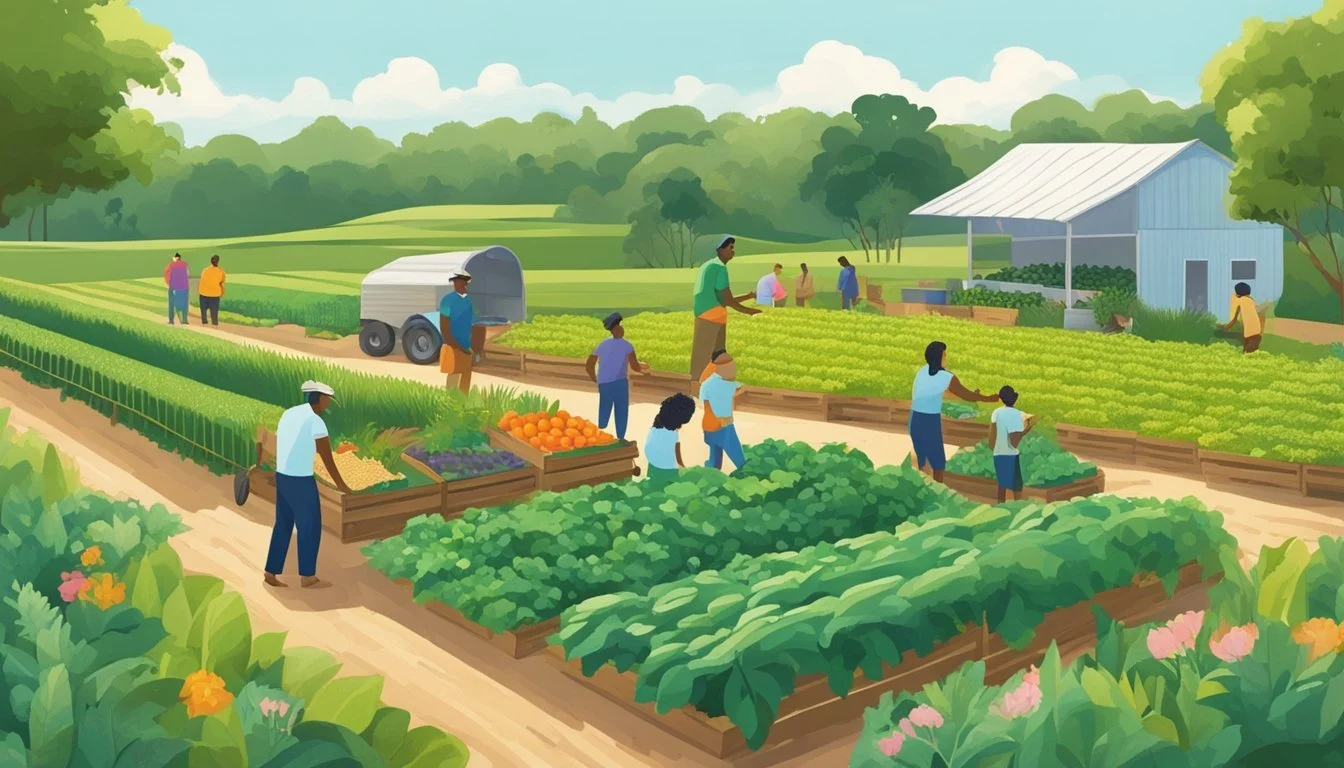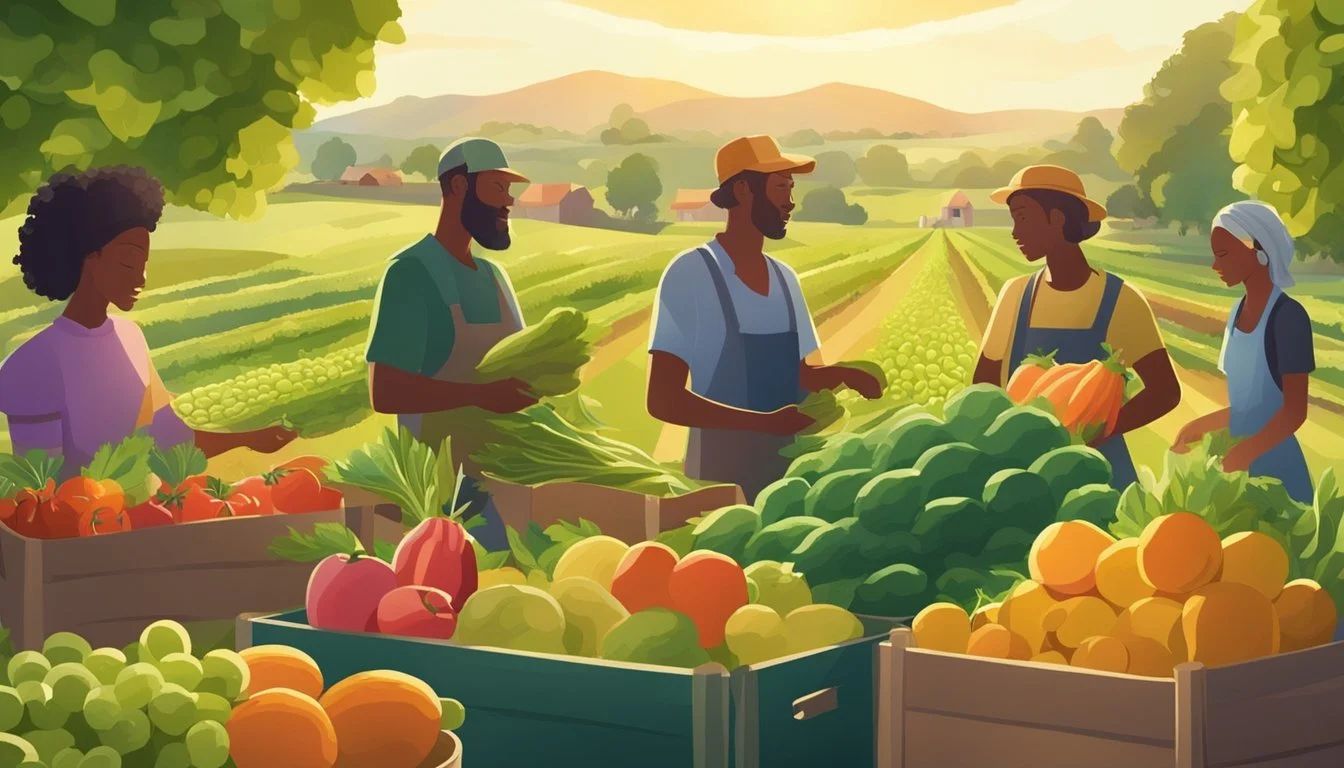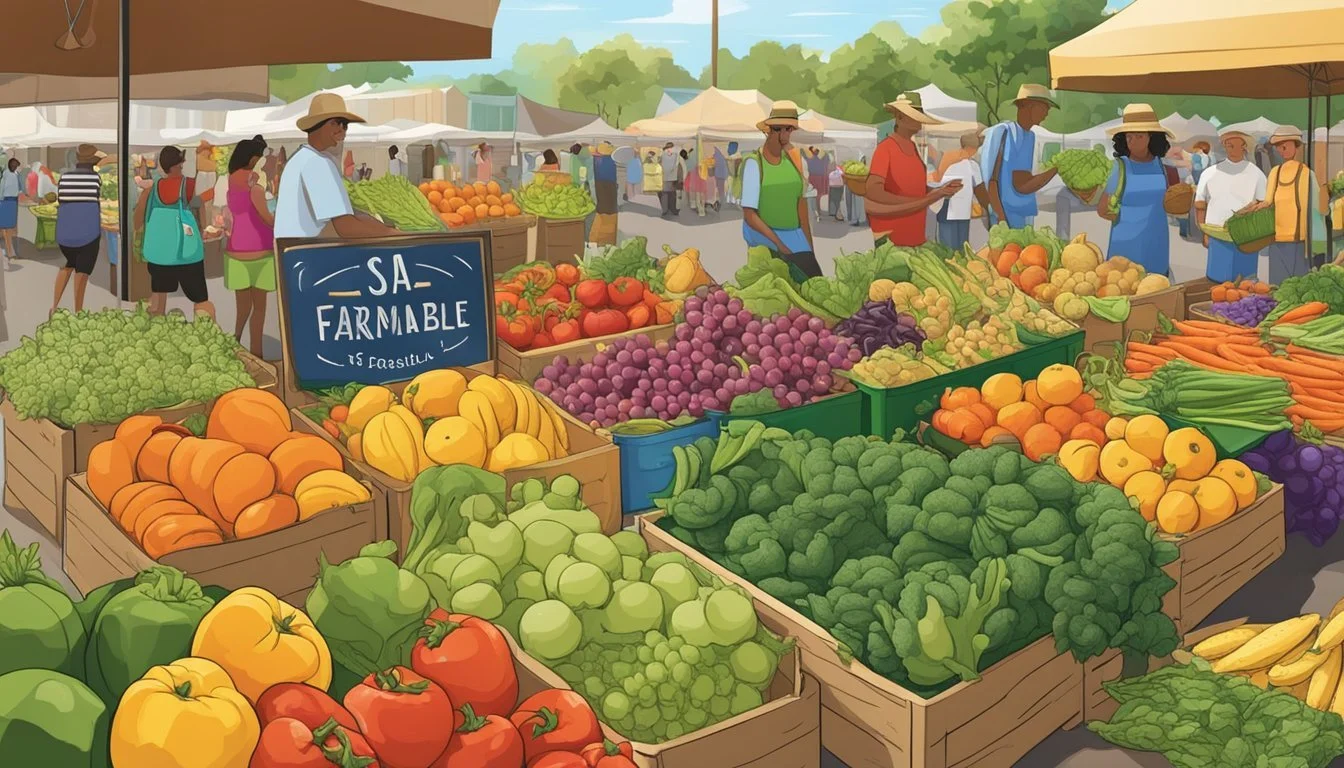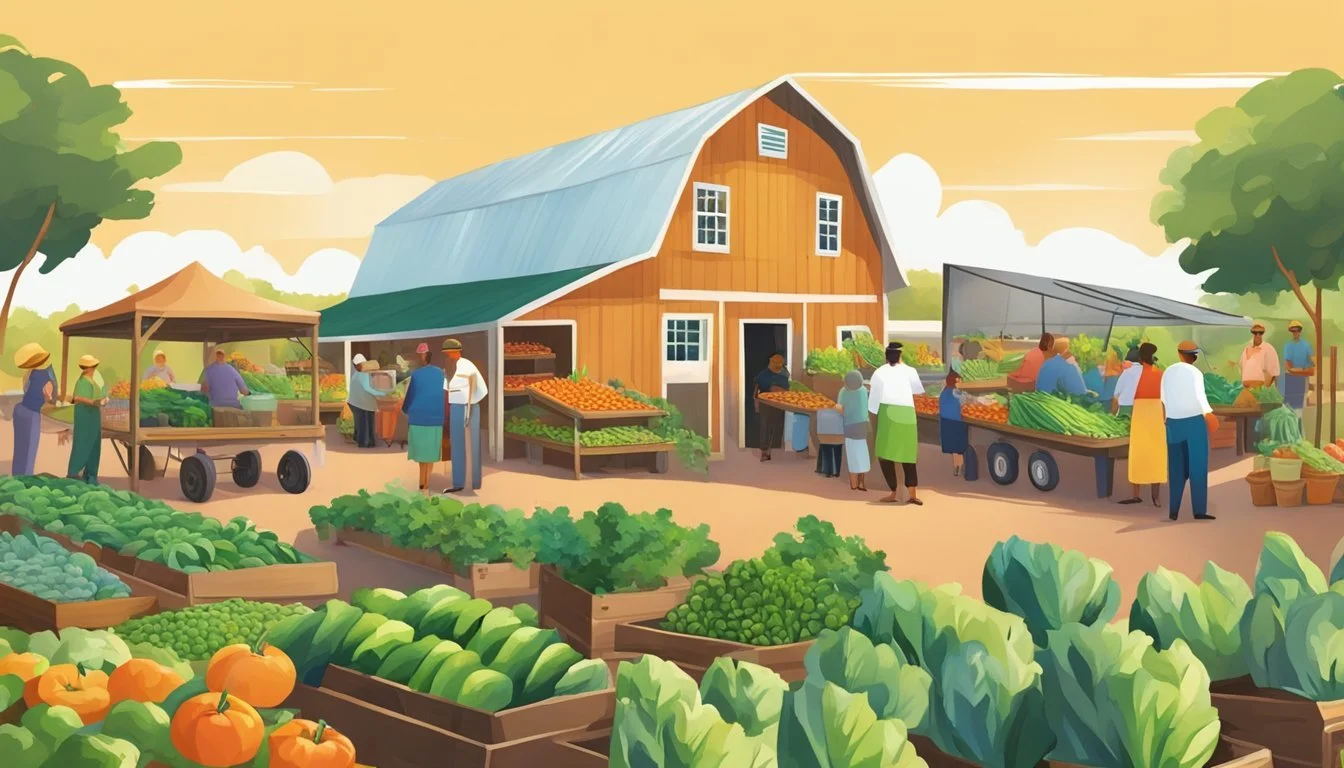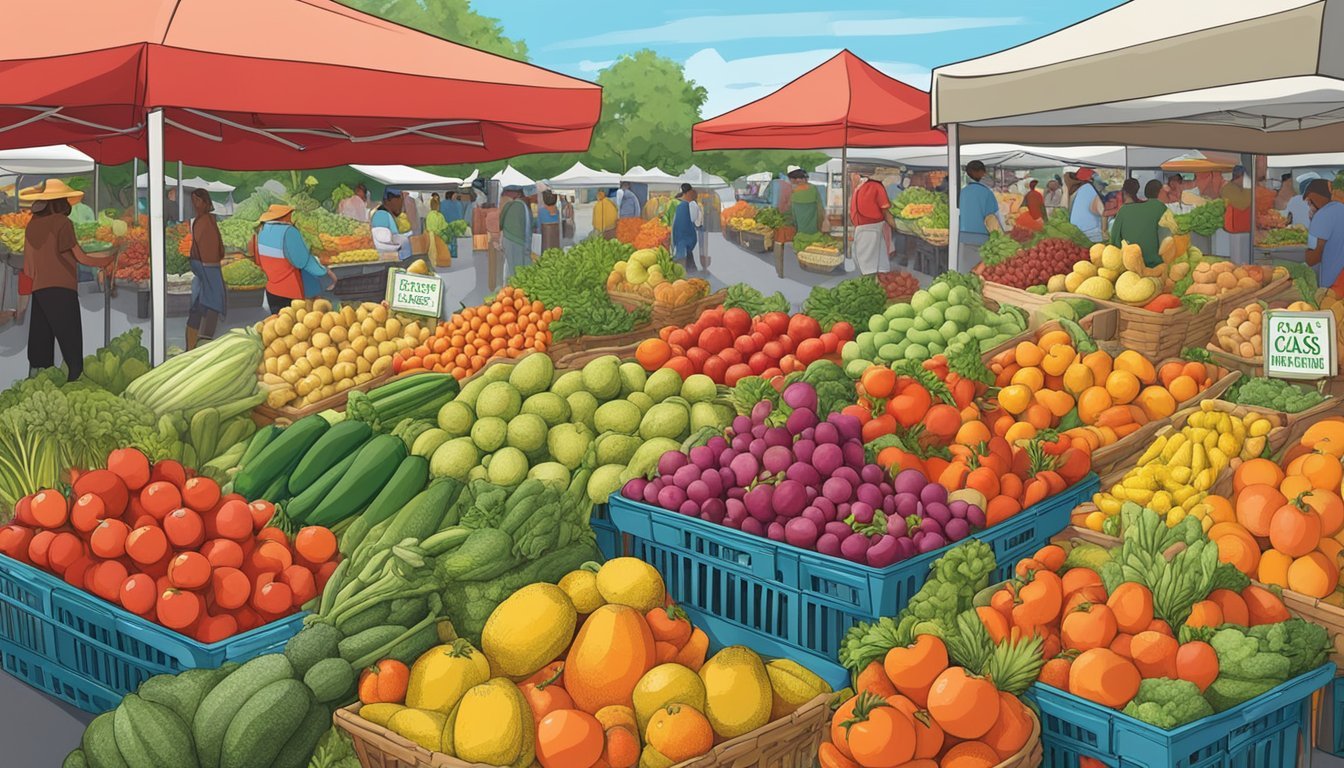Community Supported Agriculture (CSA) in Florida
A Guide to Fresh, Local Produce
Community Supported Agriculture, commonly known as CSA, presents a sustainable model for food production and distribution that has been gaining traction in Florida. This model fosters a partnership between local farmers and community members who invest in the farm at the beginning of the growing season. In return, members receive a share of the farm's harvest throughout the season. This direct relationship between producers and consumers ensures fresh, locally grown produce on the tables of Floridians while providing financial stability for farmers.
In Florida, the concept of CSA takes on various forms, offering flexibility to both farmers and members. Some CSA farms operate on the basis of members contributing labor, while others function through a monetary subscription for weekly produce shares. These shares often consist of a variety of vegetables and can include other farm products like fruits, herbs, and even eggs or dairy in some cases.
With an environment conducive to year-round farming, Florida's CSA programs often have the advantage of extended harvest seasons, allowing for a wider variety of crops. Consumers enjoy the benefits of fresh, seasonal produce while supporting local agriculture and reducing the environmental impact of food transportation. This synergy promotes community involvement, food security, and a deeper connection between Floridians and the land that feeds them.
History and Development of CSA in Florida
Community Supported Agriculture (CSA) in Florida reflects a commitment to sustainable farming practices and community engagement. This section traces the development of CSA within the state, from its origins to its current growth.
Origins of CSA
CSA, a model that originated in Europe and Japan, was established in the United States in the 1980s. Florida's CSA history is influenced by both the broader movements in the country and local initiatives. Initially, CSAs were few and, in some cases, tied to educational institutions or emerging from small-scale farmers seeking stronger community connections. These early adopters laid the groundwork for a system that would cater to the needs of both Florida's farmers and its communities.
Growth in Florida
In recent years, Florida has seen a significant increase in the number of CSAs. The Florida Farm Bureau Federation, representing over 140,000 member families, emphasizes the importance of grassroots organization in the effectiveness of CSA programs. Farms throughout the state have adopted the CSA model, offering shares to local residents. These shares typically include a portion of the season's harvest and may require a commitment of labor or monetary support. Florida’s CSA operations range in size and scope, but all share a common goal: to forge a stronger bond between local agriculture and the community.
Benefits of Participating in a CSA
Participating in a CSA program in Florida offers tangible benefits, from bolstering local agriculture to improving individual health and lessening environmental impact.
Support for Local Farmers
By subscribing to a CSA, members provide financial support directly to local farmers. This direct connection facilitates a stable income for farmers, allowing them to focus on quality and sustainable practices. In Florida, where agriculture is a key industry, CSA members become crucial stakeholders in the success of the local farms they support.
Financial Stability: Upfront payments from CSA members can help farmers plan and manage their operations more effectively.
Community Engagement: Farmers receive direct feedback from local consumers, fostering a sense of community around the food source.
Health and Nutritional Advantages
Consumers benefit from fresh, nutrient-dense produce harvested at peak ripeness, often within 24 to 48 hours of delivery. CSA shares typically include a variety of vegetables and fruits, exposing members to new, healthy food options and encouraging a more plant-based diet.
Freshness: The proximity of local farms means CSA produce often reaches consumers faster than grocery store alternatives.
Diversity: Members receive an assortment of produce, promoting a balanced diet rich in vitamins and minerals.
Environmental Impact
CSAs contribute to a reduction in carbon footprint by minimizing the distance food travels from farm to consumer. They also promote environmentally friendly farming practices, as many CSA farms in Florida use organic methods that protect the soil and local ecosystems.
Reduced Food Miles: Local produce does not have to travel far, which lessens transportation emissions.
Sustainable Practices: CSAs often utilize organic, non-GMO, and chemical-free farming techniques that are kinder to the environment.
How CSAs Work
Community Supported Agriculture (CSA) in Florida connects consumers directly with local farms through a model of membership and subscription. This system facilitates a partnership where members receive regular shares of produce and help support the farm’s operation.
Membership and Subscription Model
When individuals or families become members of a CSA, they purchase a subscription. This subscription is often referred to as buying "shares" in the farm's upcoming harvest. Shares are typically bought upfront before the harvest season, providing the farm with the capital needed to cover initial operational costs like seeds and equipment. In return, members are entitled to a portion of the farm's output over the prescribed season.
Distribution of Produce
CSAs distribute their produce in various ways. Members might pick up their shares directly at the farm, at local farmers' markets, or at designated community locations on a weekly or bi-weekly basis. The contents of shares commonly include a variety of vegetables, fruit, and sometimes added products like eggs or meat, depending on the farm's offerings.
Seasonal Offerings
Offerings of a CSA are seasonal and reflect what is currently being harvested. Florida's CSA programs generally align with regional growing seasons, which dictate when certain vegetables and fruits are at their peak freshness. Due to this seasonality, shares can vary significantly over the year, offering a direct experience of local agriculture's natural ebb and flow.
CSA Models and Management
In Florida, Community Supported Agriculture (CSA) serves as both a marketing strategy for local farmers and a means for communities to connect with and directly support agricultural endeavors. This section examines the various CSA programs available and the pivotal aspects of farm management within these systems.
Varieties of CSA Programs
CSA programs vary widely in their structure and member involvement. Traditional CSAs operate on a model where shares are purchased by the community before the growing season, funding the operation of the farm. These shares typically entitle members to a portion of the farm's harvest throughout the season. In Florida, a range of CSA options exist:
Traditional CSAs: Members pay upfront for a seasonal share of produce.
Market-Style CSAs: Pickups are more flexible with members often choosing their own selection from a specified amount.
Boxed CSAs: Pre-packed shares delivered or picked up at set locations.
The involvement of CSA members can also differ, with some CSAs encouraging or requiring members to participate in farming activities or distribution efforts. This approach can help reduce labor costs for growers and fosters a deeper community connection to the farm.
Farm Management and Operations
The success of CSA endeavors in Florida hinges on farm operation and management practices. Effective CSA management begins with planning the production to meet the anticipated need of shares. This includes:
Crop selection tailored to local preferences and climate.
Scheduling planting and harvesting to provide a consistent supply of produce.
Given that local farmers bear most of the risks associated with farming, such as unpredictable weather and crop failures, CSA members may sometimes share in that risk, which can lead to a stronger sense of community and involvement.
Record-keeping and financial management are critical to a CSA's viability. Farmers must track costs, payments, and distribution of shares to ensure the long-term sustainability of the CSA.
Overall, the management of CSAs is a blend of strategic planning, adaptive practices, and community engagement, all crucial to fostering resilient local food systems in Florida.
Finding and Choosing a CSA
When looking to join a Community Supported Agriculture (CSA) program, potential members in Florida have a wealth of options. It's important to consider local offerings and understand the level of commitment required before making a decision.
Considering Local Options
To identify local CSAs, interested consumers can start by visiting online directories such as LocalHarvest, which provide detailed listings of regional CSA programs. In Florida, one can find a variety of CSA models, ranging from traditional farm shares to more innovative approaches that may include non-vegetable products. Consumers should evaluate options such as:
Type of Shares Offered: Typical shares might contain primarily vegetables, but some CSAs also provide fruit, eggs, meat, or dairy.
Pick-up Locations: Proximity to drop-off points can impact convenience.
Season: In Florida, sign-ups may occur typically during summer, but some CSAs offer year-round or rolling enrollments.
When choosing, it's advantageous to prioritize local farms to reduce transportation impacts and support local food systems. Potential members can also attend local farmers' markets to meet growers directly and learn about their CSA offerings.
Understanding the Commitment
Joining a CSA implies a mutual commitment between the consumer and the farmer. Members typically pay upfront for a season's worth of produce and, in return, receive weekly or biweekly boxes of fresh, locally grown items. This model benefits local farmers by providing them with needed capital at the beginning of the growing season.
Financial: Members should be prepared for the initial cost and understand that, while CSAs can offer financial savings in the long run, the upfront expense may be significant.
Time: Some CSAs may expect members to contribute labor, while others might require participation in distribution or special workdays.
Consumers should carefully read the terms of the CSA to understand what level of involvement is expected beyond the financial investment.
The Role of CSAs in Florida's Community and Economy
Community Supported Agriculture programs in Florida play a pivotal role in bolstering local agriculture and contributing to the state's economy. By fostering direct connections between consumers and producers, these CSAs enable a sustainable model that benefits community members and farmers alike.
Supporting Local Agriculture
CSAs in Florida are integral to the survival and growth of local farms. By purchasing a "share" of the harvest, community members provide farmers with crucial upfront capital. This allows farmers to better manage their budgets and plan their crops, assured of a market for their produce. Local agriculture thrives as CSA members receive regular deliveries of fresh, local produce. This direct-to-consumer approach minimizes the need for long-distance transportation, ensuring the local community has access to healthy food options.
Advantages for Local Farmers:
Prepaid shares result in predictable income.
Strengthened bonds with the local community.
Ability to plan ahead with more security.
Benefits for CSA Members:
Regular supply of fresh, local food.
Knowledge of where and how their food is produced.
Participation in special farm events that deepen community ties.
Contributing to Local Economies
The impact of CSAs extends beyond just supporting farming; they stimulate economic growth within local communities. By keeping money circulating within the region, they help to sustain the local economy. Farmers' markets often serve as additional revenue streams for these local farmers, augmenting the stability provided by CSA memberships. The financial predictability offered by CSAs can encourage farmers to invest back into their operations—leading to job creation and improving the agricultural landscape.
Economic Impact:
Local Spending: Money spent on CSAs stays within the community, promoting local economic health.
Farmers' Markets: Provide additional sales venues for farmers, and attract visitors who contribute to local revenue.
Job Opportunities: Investment in farm operations can lead to new jobs on farms and within the local food system.
CSAs represent a model of mutual benefit where the community's investment in local farmers ensures the availability of fresh, healthy, local produce for the community, while also fostering economic growth and security for local farms.
Challenges and Considerations in CSA
Community Supported Agriculture (CSA) programs in Florida face an array of challenges that require careful management and strategic planning to ensure the viability and success of these agricultural cooperatives.
Managing Shared Risk
Shared Risk: It is an inherent part of the CSA model where both farmers and members have a stake in the crop yield. In Florida, unpredictable weather patterns, such as hurricanes and droughts, can pose significant risks to agricultural output.
Mitigation Strategies: CSA management should engage in proactive measures such as diversified cropping and implementing innovative farming practices to buffer against crop failure.
Member Communication: Clear communication is vital to managing shared risk. It's imperative that members understand their part in mitigating risk and are kept informed about potential issues affecting the harvest.
Membership Retention and Satisfaction
Membership Retention: The success of a CSA in Florida hinges on maintaining a strong, active community of members who renew their subscriptions.
Member Involvement: Encouraging member participation in CSA activities, such as special workdays or educational farm events, can bolster member engagement.
Member Satisfaction: Ensuring customers receive value from their share is crucial.
Quality Produce: Providing top-quality produce is non-negotiable for member satisfaction. In Florida's climate, it's especially important to focus on heat-tolerant and pest-resistant varieties.
Variety in Produce: A diverse offering can enhance the CSA experience, exposing members to new flavors and encouraging a healthier diet.
Feedback Systems: Utilizing member feedback to adjust operations, whether it's regarding the variety of produce or pick-up locations, is essential for continual improvement and member retention.
Notable CSAs in Florida
Community Supported Agriculture (CSA) programs in Florida connect consumers directly with local farmers, offering them fresh, locally grown produce. Subscribers typically receive a box of farm products weekly or bi-weekly, fostering a partnership that benefits both the local economy and the environment.
Bee Heaven Farm
Bee Heaven Farm in Redland is renowned for its diverse offering of organic produce, focusing heavily on tropical fruits and vegetables unique to the region. Members receive a share of the harvest, which might include anything from heirloom tomatoes to rare tropical fruits, underscoring the farm's commitment to variety and quality.
Worden Farm
Located in Punta Gorda, Worden Farm offers an array of organic vegetables and herbs. The farm is a pillar in the local CSA scene, with a long-standing reputation for empowering local farmers and providing them a platform to share their harvest of farm products directly with consumers.
Other Prominent CSAs
Other notable CSAs in the state include:
Swallowtail Farm in Alachua County, known for its organic practices and community enrichment programs.
The Family Garden in Gilchrist County, offers a robust selection of veggies and connects subscribers with the rhythms of local farming.
These programs emphasize the local farmer-subscriber relationship, ensuring community members receive fresh, seasonal produce while supporting sustainable agricultural practices.
Agricultural Products in Florida's CSAs
Florida's Community Supported Agriculture (CSA) programs offer a diverse array of fresh produce to their members, predominantly focusing on seasonal and organic items. Subscribers can expect a range of vegetables and fruits, including specialty and organic options, reflecting Florida's rich agricultural capacity.
Typical Produce Offered
Florida's CSAs provide an assortment of vegetables and fruits that vary with the seasons. Members can typically expect to receive:
Vegetables: bell peppers, carrots, kale, and a variety of herbs
Fruits: strawberries and other seasonal fruits depending on the harvest
These items are often picked at their peak ripeness, ensuring optimal flavor and nutritional value.
Organic and Speciality Items
Many CSAs in Florida emphasize organic produce, catering to members who prefer food grown without synthetic pesticides and fertilizers. Specialty farm products may include:
Organic Vegetables: heirloom varieties of peppers and carrots
Herbs & Flowers: organically grown herbs and edible flowers, adding unique flavors and garnishes to dishes
CSAs often support local agriculture by providing a market for small-scale, sustainable farms to sell their organic and specialty items directly to the community.
Marketing and Promoting CSAs
Marketing strategies for Community Supported Agriculture (CSA) programs in Florida focus on developing a strong connection between local farms and consumers. It's crucial to communicate the value of CSA memberships effectively to build a robust, community-supported food system.
Outreach Strategies
CSA providers need to utilize a multi-channel approach to attract members. They can harness the power of social media platforms like Facebook and Instagram to showcase fresh produce and share stories from the farms. Email campaigns can inform potential members about subscription details and the seasonal availability of products. Presence at farmers markets provides visibility and direct engagement opportunities. Utilizing attractive, informative websites or online listings can also enhance visibility. A local farm might list the following on their CSA page:
Products offered
Pick-up locations
Membership costs
Testimonials from current members
Partnerships with Local Businesses
Forming partnerships with local businesses can help CSAs expand their reach. Such collaborations may involve setting up CSA pick-up points at participating businesses or offering employee discounts to corporate partners. Local food cooperatives and health-oriented businesses tend to align well with the ethos of CSAs. By forging these partnerships, CSA programs can tap into an existing customer base interested in supporting local agriculture. An example might be a fitness center that promotes the CSA to its health-conscious clientele, emphasizing the benefits of fresh, locally-grown produce.
Future of CSA in Florida
Community Supported Agriculture (CSA) in Florida is embracing change and showing promise for expansion. Its evolution includes embracing new trends and exploring the untapped potential of local food systems.
Trends and Innovations
In the realm of CSA, Florida's farmers and communities are increasingly leveraging technology to enhance efficiency and outreach. Online platforms are rapidly becoming integral for CSA management, allowing for easier subscription services, payment processing, and communication between consumers and farmers. These tools not only streamline operations but also make it easier for consumers to access local, organic produce.
Innovative farming techniques, such as hydroponics and aquaponics, are also being integrated into CSA programs. These methods align with the organic ethos of many CSAs and can increase yield while maintaining health and sustainability standards. Furthermore, with climate change posing a challenge, such innovations contribute to resiliency in local food systems.
The Potential for Growth and Expansion
The demand for CSA memberships in Florida shows growth potential, largely because of the increasing consumer interest in healthy, locally-produced food. As awareness about the benefits of supporting community-based agriculture grows, more Floridians are likely to participate in CSA models.
Moreover, CSA's potential lies in its ability to foster closer relationships between consumers and their food systems. Through member-driven volunteer initiatives, educational outreach programs, and partnerships with schools and local businesses, CSAs can deeply embed themselves in the fabric of local communities. Expansion of CSA models can lead to a more robust, health-focused, and sustainable food culture across Florida.

